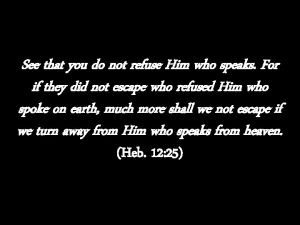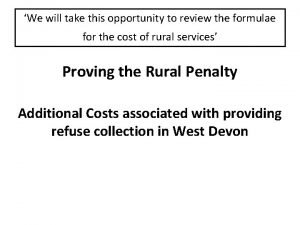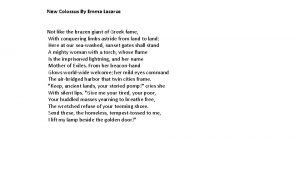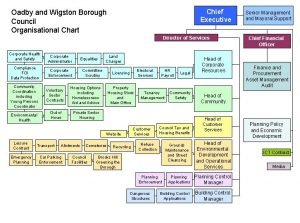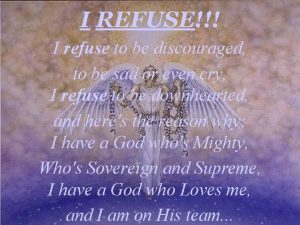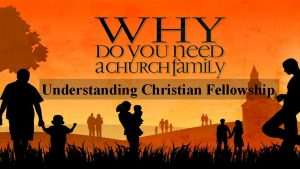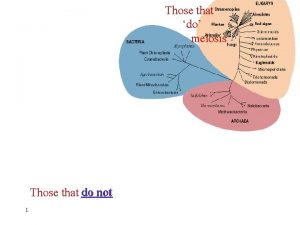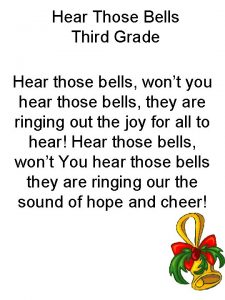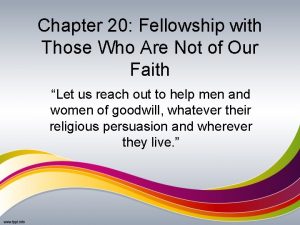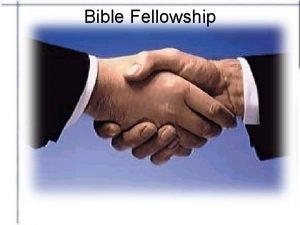The Importance of Fellowship Refuse to fellowship those

























































- Slides: 57


The Importance of Fellowship Refuse to fellowship those we should Extend fellowship to those we should not (3 John 9 -11) (2 John 9 -11)

What Is Biblical Fellowship? Review I. The Meaning of Fellowship II. The Direction of Fellowship III. The Use of Fellowship IV. The Conclusions about Fellowship

Review 2 Corinthians 6: 14– 17 14 Do not be unequally yoked together with unbelievers. For what fellowship has righteousness with lawlessness? And what communion has light with darkness? 15 And what accord has Christ with Belial? Or what part has a believer with an unbeliever? 16 And what agreement has the temple of God with idols? For you are the temple of the living God. As God has said: “I will dwell in them And walk among them. I will be their God, And they shall be My people. ” 17 Therefore “Come out from among them And be separate, says the Lord. Do not touch what is unclean, And I will receive you. ” Common Work Share in Action koinonia Harmony of thought A part together with others A union of purpose Thus: Agreement in principle leading to joint or common action in spiritual work

Review Fellowship In The Truth I. The Basis II. The Objections III. The Application

Review I. The Basis A. B. C. D. Truth is the basis for unity Truth is the basis for fellowship Truth is the basis for rejecting Truth includes the whole revelation Unity & Fellowship is Dear & Precious But Should Not be Maintained at the Expense of Truth!

Review Receive Him (Rom. 14) I. The Context II. The Point III. The Chapter IV. The Abuse V. The Application

Review II. The Point Continue in Fellowship In Spite of Differences 1. Receive him (v. 1) 2. Don’t dispute (v. 1) 3. Pursue things that make for peace (v. 19) 4. Don’t bind your opinion on others (v. 22)

Review Romans 14 Doctrine Faith Morals ? Indifference Liberty • God received him (v. 3) • To the Lord (v. 6) • Not to judge (condemn) him (v. 13) • Not wrong within itself (v. 14) • Keep it to self (v. 22)

Do Not Receive Him (2 John 9 -11) Review

Do Not Receive Him (2 John 9 -11) Review I. The Context II. The Doctrine III. The Condemned

Review III. The Condemned A. One who practices sin / error (v. 9) B. One who teacher error (v. 10) C. One who receives the false teacher (v. 11)

Applications to Controversy We must learn how to take Bible principles and apply them properly to current and future issues

Possible to Learn One Without the Other Learned Principle Learned Application Not Learned Principle

Applications to Controversy I. Principles that Must be Applied II. Instructions that Must be Followed III. Efforts that Must be Resisted IV. Warnings that Must be Heeded

Applications to Controversy I. Principles that Must be Applied

I. Principles that Must be Applied A. Actions Based upon Authority 1. Principle: We must respect Bible authority

We Must Have Bible Authority God Has A Pattern Hebrews 8: 5 Then This If This Pattern Model Real

We Must Have Bible Authority Do all in the name of the Lord (Col. 3: 17) Abide within the doctrine of Christ (2 John 9)

I. Principles that Must be Applied A. Actions Based upon Authority 1. Principle: We must respect Bible authority 2. Question : What does the word say on this issue (cf. Jer. 37: 17)? 3. Question : What is the Bible pattern for fellowship in this type of issue? a. Is this a matter of liberty / indifference? b. Is this a matter of doctrine, faith, or morals? c. Respecting the Bible pattern for fellowship – is just as important as respecting it for worship!

I. Principles that Must be Applied A. Actions Based upon Authority B. Unity Based upon the Truth 1. Principle: a. Truth is the basis for unity (John 17: 6, 17, 20 -21) b. Truth is the basis for fellowship (1 John 1: 7; 2 Jno. 9) 2. Applied: a. Question : Are we teaching and practicing the same things? b. Question : Is our unity / fellowship based upon truth or ignoring our differences?

I. Principles that Must be Applied A. Actions Based upon Authority B. Unity Based upon the Truth C. Reaction Based upon the Pattern

Two Different Patterns Romans 14 2 John 9 -11 “Receive Him” “Do Not Receive Him” Matters of Indifference Matters of Faith / Doctrine • God receives him • We should too • God rejects him • We should too

I. Principles that Must be Applied A. Actions Based upon Authority ed r o n g I / B. Unity Based upon the Truth n e t t d o e g d r r o a F g e r s i C. Reaction DBased upon the Pattern ü When it is a friend / family ü When it is a brother we like ü When it is a brother in my “group”

Applications to Controversy I. Principles that Must be Applied II. Instructions that Must be Followed What instructions were given in OT & NT concerning dealing with sin and error? Accept it? Tolerate it? Correct it?

II. Instructions that Must be Followed A. Old Testament – Sin & Error was not to be Accepted 1. 2. 3. They committed idolatry (Jer. 2: 11; 3: 1; 5: 7) Efforts made to justify (Jer. 2: 29) False prophets preached acceptance (Jer. 5: 12 -13; 6: 14; 8: 11) 4. ANSWER: Not accept it! But, correct it! (Jer. 7: 3; 36: 3, 7)

II. Instructions that Must be Followed A. Old Testament – Sin & Error was not to be Accepted B. New Testament – Sin & Error was not to be Accepted 1. Case at Corinth a. Tolerating an adulterer (1 Cor. 5) b. Perversion of the Lord’s Supper (1 Cor. 11) c. Misuse of spiritual gifts (1 Cor. 12 -14) d. Error taught on resurrection (1 Cor. 15) e. ANSWER: Not accept it! But, correct it! (1 Cor. 5: 13; 11: 33 -34; 14: 26 -33; 15: 33)

II. Instructions that Must be Followed A. Old Testament – Sin & Error was not to be Accepted B. New Testament – Sin & Error was not to be Accepted 1. Case at Corinth 2. Case at Rome a. Error (Judaism) is addressed in the book (3: 20 -21) b. ANSWER: Not accept it! But, correct it! (Rom. 16: 1718)

II. Instructions that Must be Followed A. Old Testament – Sin & Error was not to be Accepted B. New Testament – Sin & Error was not to be Accepted 1. Case at Corinth 2. Case at Rome 3. Case in Asia a. Doctrinal error tolerated (Rev. 2: 14, 20) b. Moral sins accepted (2: 14) c. ANSWER: Not accept it! But, correct it! (2: 16, 22; 3: 3, 19)

II. Instructions that Must be Followed A. Old Testament – Sin & Error was not to be Accepted B. New Testament – Sin & Error was not to be Accepted C. No Instructions in Old or New Testaments: 1. 2. 3. 4. To receive or accept the practice of sin! To receive or accept doctrinal diversity! To receive or accept diversity of morals! To receive or accept teachers of error!

Applications to Controversy I. Principles that Must be Applied II. Instructions that Must be Followed III. Efforts that Must be Resisted Efforts to broaden the scope of fellowship

III. Efforts that Must be Resisted A. Redefine “Fellowship”

G. K. Wallace 1903 -1988 “If you allow a false teacher to create his own vocabulary, his arguments will be unanswerable. ” Alan Highers, How Do You Spell (F)(f)ELLOWSHIP? , 17

III. Efforts that Must be Resisted A. Redefine “Fellowship” 1. Can have fellowship in matters wherein we agree, but not fellowship the error taught (cf. 2 John 9 -11) 2. Fellowship is merely a local church matter. There is no fellowship beyond a local church (cf. 2 Cor. 8: 4; Phil. 1: 5; 4: 14 -16) 3. Some use the terms “associate” or “reach out” for fellowship.

2 Corinthians 6: 14– 17 14 Do not be unequally yoked together with unbelievers. For what fellowship has righteousness with lawlessness? And what communion has light with darkness? 15 And what accord has Christ with Belial? Or what part has a believer with an unbeliever? 16 And what agreement has the temple of God with idols? For you are the temple of the living God. As God has said: “I will dwell in them And walk among them. I will be their God, And they shall be My people. ” 17 Therefore “Come out from among them And be separate, says the Lord. Do not touch what is unclean, And I will receive you. ” Common Work Share in Action koinonia Harmony of thought A part together with others A union of purpose Thus: Agreement in principle leading to joint or common action in spiritual work

III. Efforts that Must be Resisted A. Redefine “Fellowship” B. Redefine “False Teacher”

“False Teacher” Teaches error / false doc. • ? Dishonest Consequence: honest man could not be a false teacher • Consequence: Teacher’s attitude makes the difference:

Doctrine: Teaches Dishonest Guilty Party Can Remarry -------Error / False Honest Ma rry a M Teaches Which Couple Is In Adultery?

“False Teacher” Teaches error / false doc. • ? Dishonest Consequence: honest man could not be a false teacher • Consequence: Teacher’s attitude makes the difference: • How do we know if one is a false teacher? By what he teaches (1 John 4: 1, 6)

2 Peter 2: 1 – “False Teachers” Argument: “False Teachers” = Dishonest (vv. 3, 10) 1. Before and after – emphasis on adherence to the word a. Before: 2 Pet. 1: 12 b. After: 2 Pet. 3: 1 -2 2. “False teacher” paralleled to “false prophet” (v. 1) a. Reference to “false prophets” of OT b. Taught false doctrine (Jer. 5: 31) 3. Teach destructive heresies (2 Pet. 2: 1)

III. Efforts that Must be Resisted A. Redefine “Fellowship” B. Redefine “False Teacher” C. Historical Consistency 1. Argued that brethren in years past had unity in spite of differences over such issues as MDR 2. Makes brethren the standard – not the word (1 Pet. 4: 11; 1 Cor. 4: 6) 3. Some brethren had fellowship in spite of inst. Music 4. History does not change 2 John 9 -11

III. Efforts that Must be Resisted A. Redefine “Fellowship” B. Redefine “False Teacher” C. Historical Consistency D. Local Church Autonomy 1. Argued that when we refuse fellowship & warn about teachers of error – violation of local church autonomy 2. Makes the local church the standard (subjective standard) rather than the truth (objective standard) 3. Paul warned churches where he was not a member (Gal. 1: 7; 5: 12)

Tolerant of error and its teachers • Broaden the scope of Romans 14 • Narrow the scope of “false teacher” Point of All This: “Don’t call me a ‘false teacher’ or cut off fellowship because you think my doctrine is wrong. Allow me to teach what I want!”

Applications to Controversy I. Principles that Must be Applied II. Instructions that Must be Followed III. Efforts that Must be Resisted IV. Warnings that Must be Heeded

IV. Warnings that Must be Heeded A. Beware of drifting 1. The winds of change are blowing 2. Departure of the present day – differs from the past now many symptoms: • Softer preacher • Loose on worldliness • Blurring lines of individual and church • Confusing cordiality / excitement with spirituality • Divorce & remarriage • Cast doubts on credibility of Genesis account • Claims that we are not under law

IV. Warnings that Must be Heeded A. Beware of drifting 1. The winds of change are blowing 2. Departure of the present day – differs from the past now many symptoms: 3. Danger: the changes are gradual.

Hebrews 2: 1 “Therefore we must give the more earnest heed to the things we have heard, lest we drift away” (NKJV) Therefore we ought to give the more earnest heed to the things which we have heard, lest at any time we should let them slip. (KJV) Footnote KJV “run out as leaking vessels”

Gradually & Slowly Heb. 2: 1 30 5 10 15 20 25 35 40 45 50 55

Gradually & Slowly Heb. 2: 1 55 60 65 70 75 80 85 90 95 100 105 110

IV. Warnings that Must be Heeded A. Beware of drifting B. Understand there can be false teachers among us 1. Acts 20: 30 2. 2 Pet. 2: 1

IV. Warnings that Must be Heeded A. Beware of drifting B. Understand there can be false teachers among us C. Know the text in context 1. 2 Pet. 3: 16 -18 2. A well informed church – insulated against apostasy

IV. Warnings that Must be Heeded A. Beware of drifting B. Understand there can be false teachers among us C. Know the text in context D. Realize that compromise will not work 1. Common idea: I can teach against a doctrine while fellowshipping those who teach and practice it 2. Contrary to 2 John 9 -11 3. Those who have tried – have failed

Churches That Would Not Tolerate Preaching Against Premillennialism 1930’s & 1940’s • During / shortly after the “Premillennialism” controversy • Many churches (rejected the false doctrine) • Also didn’t tolerate the preaching against it • Not one of them stood – 50’s /60’s Roy E. Cogdill Foy E. Wallace, Jr.

Mc. Garvey Taught Against The Instrument But Fellowshipped Those Who Used It J. W. Mc. Garvey 1829 -1911 Brother Mc. Garvey said to me: "Brother Sewell I want to say something to you, if you'll accept it in the spirit in which I mean it. " I told him I'd appreciate anything he had to say to me. He said about these words, "You are or the right road, and whatever you do, don't ever let anybody persuade you that you can successfully combat error by fellowshipping it and going along with it. I have tried. I believed at the start that was the only way to do it. I've never held membership in a congregation that uses instrumental music. I have, however, accepted invitations to preach without distinction between churches that used it and churches that didn't. I've gone along with their papers and magazines and things of that sort. During all these years I have taught the truth as the New Testament teaches it to every young preacher who has passed through the College of the Bible. Yet, I do not know of more than six of those men who are preaching the truth today. " He said, "It won't work. “ - J. P. Sewell Doctrine of Christ and Unity of the Saints , 129 -130

Mc. Garvey Taught Against The Instrument But Fellowshipped Those Who Used It And as someone said, “while he preached against the organ he went where they used it and his influence went with his fellowship instead of with his teaching. ” Someone wrote to me from Indiana and said, “Do you remember when you were there whether any of the students were influenced by Mc. Garvey and his talk position on the organ? ” I said, “No I can’t remember a single man – a single one that was changed. ” It was because he didn’t teach it as consistently as he ought to and didn’t back it up by his presence. Henry S. Ficklin, Reminiscing With Mc. Garvey, Florida College Lectures, 1967 Lesson: J. W. Mc. Garvey 1829 -1911 Can’t combat error by fellowshipping it Influence will go with your fellowship!

Applications to Controversy I. Principles that Must be Applied II. Instructions that Must be Followed III. Efforts that Must be Resisted IV. Warnings that Must be Heeded

 I'll make him an offer he can't refuse
I'll make him an offer he can't refuse Socratic seminar questions for the crucible act 2
Socratic seminar questions for the crucible act 2 Wait 3.hali
Wait 3.hali Dustless refuse collector
Dustless refuse collector Verb patterns ing or infinitive
Verb patterns ing or infinitive See that you do not refuse him who speaks
See that you do not refuse him who speaks Refusal skills define
Refusal skills define West devon borough council refuse collection
West devon borough council refuse collection Waste management definition
Waste management definition What was the sickening comic aspect
What was the sickening comic aspect Emma lazarus quote
Emma lazarus quote Why did rockwood refuse to conform to group pressure
Why did rockwood refuse to conform to group pressure Wood recycling swansea
Wood recycling swansea Ways to refuse peer pressure
Ways to refuse peer pressure Refuse collection tonbridge
Refuse collection tonbridge 5r recycle
5r recycle I refuse to be discouraged poem
I refuse to be discouraged poem Oadby and wigston refuse tip
Oadby and wigston refuse tip Cong thức tính động năng
Cong thức tính động năng Sự nuôi và dạy con của hươu
Sự nuôi và dạy con của hươu Tỉ lệ cơ thể trẻ em
Tỉ lệ cơ thể trẻ em Dot
Dot Nguyên nhân của sự mỏi cơ sinh 8
Nguyên nhân của sự mỏi cơ sinh 8 Phản ứng thế ankan
Phản ứng thế ankan Môn thể thao bắt đầu bằng từ chạy
Môn thể thao bắt đầu bằng từ chạy Thiếu nhi thế giới liên hoan
Thiếu nhi thế giới liên hoan Phối cảnh
Phối cảnh Hình ảnh bộ gõ cơ thể búng tay
Hình ảnh bộ gõ cơ thể búng tay điện thế nghỉ
điện thế nghỉ Một số thể thơ truyền thống
Một số thể thơ truyền thống Trời xanh đây là của chúng ta thể thơ
Trời xanh đây là của chúng ta thể thơ Hệ hô hấp
Hệ hô hấp Gấu đi như thế nào
Gấu đi như thế nào Thế nào là số nguyên tố
Thế nào là số nguyên tố đặc điểm cơ thể của người tối cổ
đặc điểm cơ thể của người tối cổ Các châu lục và đại dương trên thế giới
Các châu lục và đại dương trên thế giới ưu thế lai là gì
ưu thế lai là gì Thế nào là hệ số cao nhất
Thế nào là hệ số cao nhất Tư thế ngồi viết
Tư thế ngồi viết Thẻ vin
Thẻ vin Ng-html
Ng-html Cái miệng nó xinh thế
Cái miệng nó xinh thế Mật thư tọa độ 5x5
Mật thư tọa độ 5x5 Từ ngữ thể hiện lòng nhân hậu
Từ ngữ thể hiện lòng nhân hậu Glasgow thang điểm
Glasgow thang điểm Tư thế ngồi viết
Tư thế ngồi viết V cc
V cc Thể thơ truyền thống
Thể thơ truyền thống Hươu thường đẻ mỗi lứa mấy con
Hươu thường đẻ mỗi lứa mấy con Các châu lục và đại dương trên thế giới
Các châu lục và đại dương trên thế giới Diễn thế sinh thái là
Diễn thế sinh thái là Bổ thể
Bổ thể Vẽ hình chiếu vuông góc của vật thể sau
Vẽ hình chiếu vuông góc của vật thể sau Làm thế nào để 102-1=99
Làm thế nào để 102-1=99 Thế nào là mạng điện lắp đặt kiểu nổi
Thế nào là mạng điện lắp đặt kiểu nổi Bài hát chúa yêu trần thế alleluia
Bài hát chúa yêu trần thế alleluia Lời thề hippocrates
Lời thề hippocrates Vẽ hình chiếu đứng bằng cạnh của vật thể
Vẽ hình chiếu đứng bằng cạnh của vật thể





